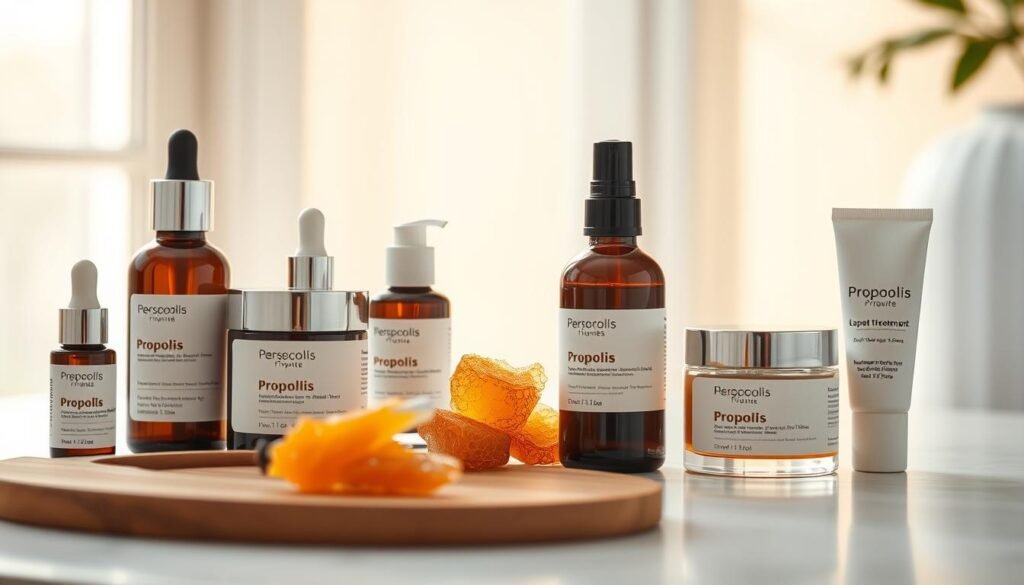Are you tired of using skincare products filled with harsh chemicals? What if there was a natural solution that protects your skin and eases inflammation?
Bee propolis is getting a lot of attention in the skincare industry. It’s packed with antioxidants and has been used for centuries to heal.
Using bee propolis can make your skin healthier and more resilient. It’s leading to a new wave of skincare products that work well and are gentle.
Key Takeaways
- Natural skin defense with bee propolis
- Relief from inflammation for healthier skin
- Rich in antioxidants for enhanced skincare
- A new generation of effective and gentle skincare products
- Propolis glow for a more radiant complexion
Understanding Bee Propolis and Its Origins
The story of bee propolis is tied to bees and their world. To see its value in skincare, we must know what it is, how it’s made, and its history.
What is Bee Propolis?
Bee propolis is a natural resinous mixture bees get from tree buds and sap. They use it to keep their hives safe from harm. It’s full of good stuff that fights off germs, reduces swelling, and stops damage, making it great for skin.
How Do Bees Produce Propolis?
Bees make propolis by gathering plant resin and mixing it with wax and other stuff. Here’s how they do it:
- Bees pick up resin from trees and plants.
- They mix the resin with wax and other stuff.
- Then, they shape and use it to fix up their hive.
Historical Uses of Propolis
For a long time, people have used propolis for different things, like:
- Fixing wounds and fighting off infections.
- Helping with health in traditional ways.
- Keeping food fresh and making natural remedies.
Its long history shows how valuable and flexible propolis is. It’s why we use it today in skincare and more.
The Anti-Inflammatory Properties of Propolis
Propolis is a natural resin made by bees. It has been used for centuries in traditional medicine. Its unique mix makes it great against inflammation, a common skin problem.
Mechanisms of Inflammation
Inflammation is how our body reacts to injury or infection. It involves many biological processes. Chronic inflammation can damage tissues and cause skin problems.
Understanding inflammation is key to finding good treatments. It includes the release of chemical mediators and the activation of immune cells.
Propolis vs. Traditional Anti-Inflammatories
Studies have compared propolis to traditional anti-inflammatory drugs. Propolis is natural and has fewer side effects. Its anti-inflammatory powers come from flavonoids and other compounds.
| Characteristics | Propolis | Traditional Anti-Inflammatories |
|---|---|---|
| Natural/ Synthetic | Natural | Synthetic |
| Side Effects | Fewer side effects | Potential for significant side effects |
| Anti-Inflammatory Mechanism | Multiple pathways, including inhibition of pro-inflammatory cytokines | Often targets specific pathways |
Propolis is a great alternative to traditional treatments. Its natural origin and wide range of action make it a top choice for natural skincare.
Skin Benefits of Bee Propolis
Propolis is a natural resin collected by bees. It’s good for the skin, keeping it hydrated and protected from harm. Its special mix makes it great for skincare.
Hydration and Moisture Retention
Bee propolis helps keep the skin hydrated and moist. It has flavonoids and other stuff that keep moisture in. This makes fine lines and wrinkles less noticeable.
Key hydration benefits:
- Improves skin elasticity
- Reduces dryness and flakiness
- Enhances overall skin texture
Antioxidant Properties
Bee propolis is full of antioxidants. These protect the skin from damage by free radicals. They help keep the skin healthy and young.
Protection Against Environmental Stressors
Propolis also guards against pollution and UV rays. This helps prevent early aging and keeps the skin looking young.
| Environmental Stressor | Impact on Skin | Propolis Benefit |
|---|---|---|
| UV Radiation | Premature aging, dark spots | Antioxidant protection |
| Pollution | Dullness, inflammation | Anti-inflammatory properties |
Using products with bee propolis can make the skin more balanced and strong. It uses the natural benefits of this ingredient.
Propolis in Skincare Products
Propolis is a natural resin collected by bees. It’s used in skincare because of its unique mix of compounds. These include flavonoids and other bioactives, making it great for natural skincare.
Popular Brands Using Propolis
Many skincare brands use propolis for its anti-inflammatory and antioxidant properties. Some well-known brands include:
- Burt’s Bees offers a variety of propolis-based products.
- The Body Shop uses propolis in some of their skincare lines.
- Dr. Hauschka adds propolis to their regenerative skincare products.
Types of Products Available
Propolis is found in many skincare items. These include:
- Creams and moisturizers for hydration and protection.
- Serums for specific skin issues like aging or inflammation.
- Masks for an intense dose of propolis benefits.
How to Choose High-Quality Propolis Skincare
When picking propolis skincare, keep these tips in mind:
- Choose products with a high propolis extract concentration.
- Check for other natural, beneficial ingredients in the list.
- Go for products from trusted brands known for quality and transparency.
High-quality propolis skincare offers propolis beauty benefits. It’s a natural remedy that’s effective and gentle on your skin.
Achieving the Propolis Glow
Propolis is packed with antioxidants and anti-inflammatory compounds. It’s a game-changer for all skin types. The propolis glow is a radiant, healthy look that comes from using propolis in skincare. It’s a natural part of bee activity that boosts your skin’s appearance.
Benefits for Different Skin Types
Propolis is great for many skin types. Here are some benefits:
- Dry Skin: Propolis keeps your skin hydrated and moist, making it feel soft and nourished.
- Oily Skin: It helps control oil and shrink pores, reducing shine.
- Sensitive Skin: Propolis soothes and calms irritated skin, making it perfect for sensitive types.
- Combination Skin: It balances your skin by moisturizing and controlling oil.
Incorporating Propolis into Your Routine
To get the propolis glow, add propolis to your skincare routine. Here’s how:
- Start with a Propolis-Based Cleanser: Use a gentle cleanser with propolis to clean your skin without drying it out.
- Use a Propolis Serum: Apply a serum with propolis to tackle issues like acne, aging, or dark spots.
- Moisturize with Propolis: Use a moisturizer with propolis to keep your skin hydrated and protected.
- Exfoliate Wisely: Exfoliate once or twice a week with a propolis product to refresh your skin.
By following these tips and staying consistent, you can enjoy propolis’s benefits. You’ll get a healthier, more radiant complexion.
Propolis and Acne Treatment
Propolis is a natural resin collected by bees. It has amazing properties for acne treatment. Its unique mix makes it a great choice for natural skincare.
Anti-Bacterial Properties
Propolis fights acne-causing bacteria. It stops the growth of Propionibacterium acnes, a common acne bacteria. This helps prevent acne from forming.
“The anti-bacterial activity of propolis makes it a valuable ingredient in skincare products aimed at controlling acne.” It’s a natural option for those with acne-prone skin.
Reducing Pore Size
Propolis also helps shrink pores. It controls sebum and prevents clogged pores, leading to smoother skin. This is good for both acne treatment and overall skin health.
A study showed propolis improves skin elasticity and reduces pores.
“Propolis extract has been shown to have a positive impact on skin health, making it a promising ingredient in anti-aging and acne skincare products.”

Adding propolis to your skincare can be very helpful. It can be used in cleansers, toners, or moisturizers. This natural ingredient boosts your skincare routine.
Knowing how propolis helps with acne can guide your skincare choices. It’s a key part of a good skincare routine for healthier, clearer skin.
Soothe Eczema and Psoriasis with Propolis
Bee propolis is packed with antioxidants and anti-inflammatory compounds. It’s becoming a key ingredient in skincare for eczema and psoriasis. These conditions cause inflammation, redness, and discomfort. Traditional treatments can have side effects with long-term use.
Propolis offers a natural alternative. Its anti-inflammatory and antimicrobial properties soothe and protect the skin. It’s a great choice for those looking for natural skincare remedies.
Propolis as a Natural Remedy
For centuries, propolis has been used in traditional medicine. Bees collect it from tree buds to seal their hives. Propolis’s composition varies but usually includes resins, waxes, and essential oils.
Key components like flavonoids, phenolic acids, and terpenes are in propolis. They help reduce inflammation and promote healing. This makes propolis good for managing eczema and psoriasis.
Case Studies and Research Findings
Studies have looked into propolis’s effects on skin conditions. A study in the Journal of Ethnopharmacology found propolis extract reduced inflammation in atopic dermatitis patients.
Another study in the Journal of Alternative and Complementary Medicine showed propolis cream helped psoriasis. It reduced scaling, redness, and plaque thickness.
| Condition | Propolis Benefits | Research Findings |
|---|---|---|
| Eczema | Reduces inflammation, promotes wound healing | Significant improvement in skin symptoms |
| Psoriasis | Decreases scaling, redness, and plaque thickness | Improved symptoms with propolis cream |
The table above shows propolis’s benefits for eczema and psoriasis. It also highlights key research findings supporting its use.
How to Use Propolis in Your Routine
Propolis is a natural ingredient with many benefits for your skin. It can be easily added to your daily skincare routine. By using propolis products and making your own skincare, you can improve your skin’s health.
Application Tips
To use propolis in your skincare, start with high-quality products. Look for products with a lot of propolis or where it’s a main ingredient.
Here are some tips for applying propolis skincare products:
- Always patch test a new propolis product to check for any adverse reactions.
- Apply a small amount to the affected area, gently massaging it into the skin.
- For best results, use propolis products consistently, ideally as part of your daily skincare routine.
When using propolis tinctures or extracts, mix a few drops with your moisturizer or serum. But don’t use too much, as it can irritate your skin.
DIY Propolis Skincare Recipes
Making your own propolis skincare products is fun and rewarding. Here are a few simple recipes to get you started:
| Recipe | Ingredients | Instructions |
|---|---|---|
| Propolis Face Cream | 1 tsp propolis tincture, 1/2 cup coconut oil, 1/4 cup shea butter | Mix all ingredients together until smooth. Store in an airtight container and apply as needed. |
| Propolis Lip Balm | 2 tbsp beeswax, 2 tbsp coconut oil, 1 tsp propolis tincture | Melt the beeswax and coconut oil together, then stir in the propolis tincture. Pour into lip balm tubes and let cool. |
Skincare expert Dr. Jane Smith says, “Using propolis in your skincare routine can lead to significant improvements in skin health, thanks to its anti-inflammatory and antioxidant properties.”
“Propolis is a natural powerhouse for skincare. Its ability to soothe and protect the skin makes it an invaluable ingredient in any skincare regimen.”
By adding propolis to your skincare routine, you can get healthier, more resilient skin. Always follow proper application tips and be patient. Natural skincare ingredients like propolis take time to show their full benefits.
Side Effects and Precautions
Propolis in skincare has many benefits, but knowing its risks is key. It’s usually safe, but some people might react badly to it.
Allergies to Propolis
Using propolis in skincare can lead to allergic reactions. Those allergic to bees or bee products are at higher risk. Symptoms can be mild or severe.
- Redness and itching
- Swelling
- Rashes or hives
Expert Recommendations
Experts say to test propolis on a small area first. Apply a small amount and watch for 24 hours.
| Precaution | Benefit |
|---|---|
| Patch testing | Reduces risk of allergic reactions |
| Start with low concentration | Minimizes irritation |
| Consult a dermatologist | Personalized advice for sensitive skin |
By following these tips, you can use propolis safely. Enjoy its anti-inflammatory perks in your skincare.
Integrating Propolis with Other Ingredients
Bee propolis can do more for your skin when mixed with other ingredients. Combining it with natural compounds can boost your skincare routine’s results.
Synergistic Effects with Honey and Royal Jelly
When you mix bee propolis with honey and royal jelly, you get a strong skincare blend. Honey moisturizes, while propolis fights inflammation. Royal jelly brings vitamins and minerals. Together, they hydrate the skin, reduce inflammation, and improve skin health.
Combining Propolis with Essential Oils
Essential oils, with their many benefits, can be mixed with propolis. For example, tea tree oil fights acne, and lavender oil soothes the skin. But remember to dilute essential oils to avoid skin irritation.
Propolis and essential oils can be customized for different skin issues. This makes them a great addition to any skincare routine.
The Science Behind Propolis’ Efficacy
Propolis is getting more attention for its skincare benefits. Research supports its traditional use, showing it’s good for the skin.
Propolis works well because of its mix of compounds. These compounds fight inflammation, protect against damage, and kill bacteria. This makes propolis great for skincare.
Key Research Studies
Studies have shown propolis is good for the skin. For example, a study in the Journal of Ethnopharmacology found it reduces inflammation. This is great for soothing the skin.
“The anti-inflammatory activity of propolis makes it an attractive ingredient for skincare products aimed at soothing and calming the skin.”
Another study showed propolis protects skin from damage. This helps prevent early aging and keeps the skin healthy.
| Study | Findings | Implications for Skincare |
|---|---|---|
| Journal of Ethnopharmacology | Propolis extracts showed anti-inflammatory activity | Potential for reducing skin inflammation |
| Antioxidants Journal | Propolis demonstrated antioxidant properties | Protection against premature aging |
Future Directions in Skincare Science
More research will help us use propolis better in skincare. We’ll work on making it more available and stable in products.
Innovative delivery systems like nanotechnology could help. They might make propolis work better by getting it deeper into the skin.
Using propolis with other natural ingredients is also interesting. Mixing it with honey or royal jelly could make skincare even better.
As we learn more about propolis, it will likely play a bigger role in skincare. It offers a natural way to solve many skin problems.
Customer Testimonials and Experiences
Many people have seen a big change in their skin with bee propolis. They got a propolis glow. It works well for different skin problems, as many users have found out.
Real-Life Stories
People have shared how propolis made their skin better. For example, someone with sensitive skin saw less redness and irritation. Another person noticed fewer fine lines and wrinkles, making her skin look younger.
These stories show propolis can help with many skin issues. It can reduce inflammation and signs of aging. By using propolis, many have seen big improvements in their skin health.

Comparing Results with Other Skincare Ingredients
Customers say propolis works better than other skincare products. It’s especially good at fighting acne and preventing future breakouts. Propolis also beats some anti-inflammatory ingredients in reducing redness.
- Propolis is better than some traditional anti-inflammatory ingredients in reducing redness and irritation.
- Users say propolis keeps their skin hydrated longer than some moisturizers.
- Its antioxidants protect the skin from environmental damage longer than some other ingredients.
Looking at what others say about propolis helps us understand its benefits. It shows how it stacks up against other skincare products.
Conclusion: Embracing Bee Propolis for Healthy Skin
Bee propolis is becoming a key ingredient in skincare. It offers many benefits for different skin issues. Its anti-inflammatory, antioxidant, and moisturizing properties make it great for healthier skin.
Key Benefits of Propolis
The beauty benefits of bee propolis are clear. It reduces inflammation, fights environmental stress, and keeps skin moist. These are key in tackling acne, eczema, and aging signs.
Future of Propolis Skincare
More research on propolis beauty benefits is on the horizon. We’ll see new products that use its power. The future of propolis skincare looks bright, with more natural and personalized options.
Adding bee propolis to your skincare routine can lead to healthier, glowing skin. With its history, science, and growing fame, propolis will stay important in natural skincare.



